Module10 基础知识梳理
Module10__知识点总结
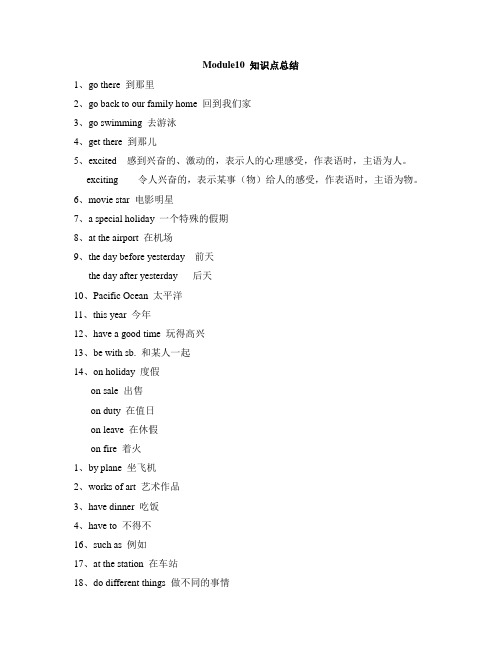
Module10 知识点总结1、go there 到那里2、go back to our family home 回到我们家3、go swimming 去游泳4、get there 到那儿5、excited 感到兴奋的、激动的,表示人的心理感受,作表语时,主语为人。
exciting 令人兴奋的,表示某事(物)给人的感受,作表语时,主语为物。
6、movie star 电影明星7、a special holiday 一个特殊的假期8、at the airport 在机场9、the day before yesterday 前天the day after yesterday 后天10、Pacific Ocean 太平洋11、this year 今年12、have a good time 玩得高兴13、be with sb. 和某人一起14、on holiday 度假on sale 出售on duty 在值日on leave 在休假on fire 着火1、by plane 坐飞机2、works of art 艺术作品3、have dinner 吃饭4、have to 不得不16、such as 例如17、at the station 在车站18、do different things 做不同的事情19、spend all day 花整天时间spend 与takespend 主语必须是人,常用于spend tine / money on sth.“ 在…上花费时间/金钱”,或spend time/money (in) doing sth.“花费时间/金钱做某事”。
take 常用句型为:It takes sb.+时间+to do sth.表示“做某事花了某人多少时间”。
20、take lots of photos 照许多照片21、go with sb. 与某人一起去22、take a walk 散步23、street market 街头市场24、do shopping 购物25、all day 整天26、wait in line排队等候cut in line 插队27、at the top of 在…顶端28、how long 表示“多久,多长时间”,用来提问时间的长短,常用“for+一段时间”或“since+时间点/一段时间+ago”或“si nce+从句”作答。
Module 10课文知识点总结(含语法)-外研版八年级下册英语
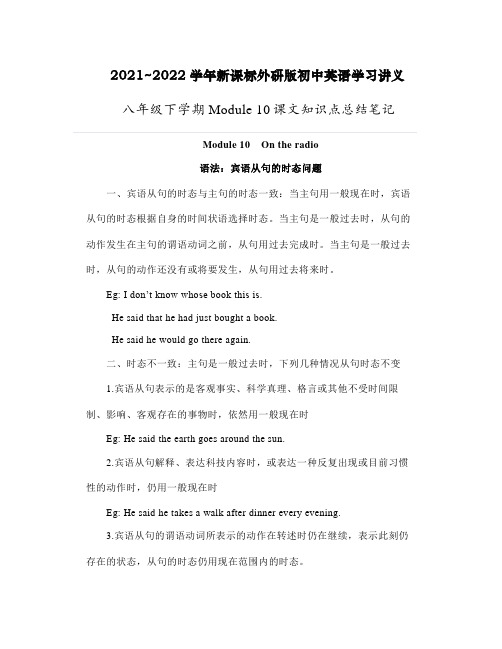
2021~2022学年新课标外研版初中英语学习讲义八年级下学期Module 10课文知识点总结笔记Module 10 On the radio语法:宾语从句的时态问题一、宾语从句的时态与主句的时态一致:当主句用一般现在时,宾语从句的时态根据自身的时间状语选择时态。
当主句是一般过去时,从句的动作发生在主句的谓语动词之前,从句用过去完成时。
当主句是一般过去时,从句的动作还没有或将要发生,从句用过去将来时。
Eg: I don’t know whose book this is.He said that he had just bought a book.He said he would go there again.二、时态不一致:主句是一般过去时,下列几种情况从句时态不变1.宾语从句表示的是客观事实、科学真理、格言或其他不受时间限制、影响、客观存在的事物时,依然用一般现在时Eg: He said the earth goes around the sun.2.宾语从句解释、表达科技内容时,或表达一种反复出现或目前习惯性的动作时,仍用一般现在时Eg: He said he takes a walk after dinner every evening.3.宾语从句的谓语动词所表示的动作在转述时仍在继续,表示此刻仍存在的状态,从句的时态仍用现在范围内的时态。
Eg: She told me the other day that she is only eight.4.从句中有具体的时间状语,动作是发生在主句动作之前,仍用一般过去时,不改为过去完成时Eg: He said that he was born in 1998.1.Thank you for… = Thanks for + 名词、代词、动词ing因…而感谢2.show… around = take… around= take… to visit带…参观Eg: Can you show/ take us around your factory?= Can you take us to visit your factory?e this way 这边请4.be on (灯等)亮;(电影等)上映5.mean to do sth. 想或企图做某事mean doing sth. 意味着做某事mean (v.)--- meaning (n.) 意思Eg: I had meant to visit you, but I was too busy.My new job will mean travelling all over the world.6.on air 正在广播Eg: We will be on air in ten minutes.7.avoid doing sth. 避免做某事avoid 后接名词、代词或动名词Eg: You should avoid making the same mistakes.avoid (v.) 回避;避开Eg: Everyone seemed to be avoiding him.avoid(v.) 逃避Eg: You should avoid over-spending.8.make some noise 制造噪音9.the latest national and international news 最新的国内、国际新闻10.get crazy 令人发狂be crazy about…热衷于;迷恋于like crazy 发狂似的;极度地go crazy变得疯狂drive sb. crazy 让某人疯狂11.keep doing sth. 不断做某事12.do interview with sb.= interview sb. 采访某人interview --- interviewer 采访者/ interviewee被采访者13.keep quiet 保持安静14.if (1) “如果”引导条件状语从句,如果放在主句前,从句要用逗号与主句隔开Eg: I won’t go by plane if it rains tomorrow.If you want to go, please tell me.(2)if所引导的条件句,要遵循“主将从现”原则Eg: If it doesn’t rain tomorrow, we’ll go to the Great Wall.(3) if引导的条件句,当条件成立必然有某种结果时,主句和从句用一般现在时Eg: If you drop a glass, it breaks.(4)if “是否”时,不用主将从现Eg: I don’t know if it will rain tomorrow.15.against (prep.) “以…为竞争对手;与…对抗”后接名词、代词、动词ingEg: Yesterday we played against a very strong team and we won.反对;对抗Eg: My father is against my plan.16.t he end of……的尾声at the end of…在…末端by the end of…直到…为止in the end 最后;最终1.look down at…低下头看look down upon 瞧不起2.Shouldn’t you be at school?你不用上学吗?这是一个否定疑问句,用于表示惊奇。
Module10知识点梳理外研版英语八年级下册
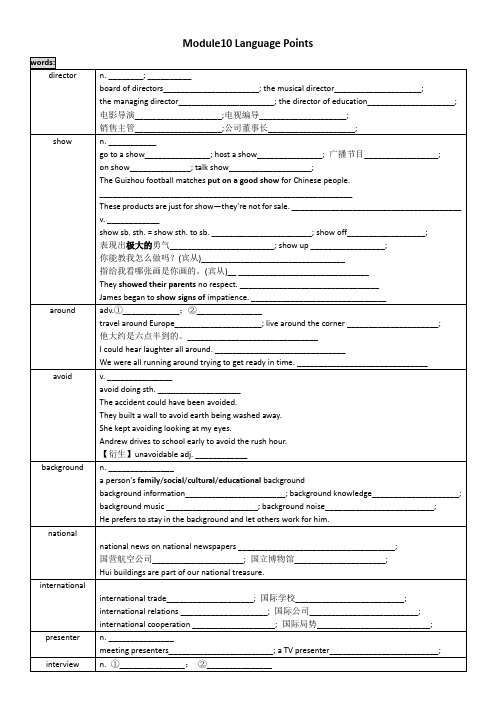
national news on national newspapers ____________________________________; 国营航空公司_____________________; 国立博物馆_____________________; Hui buildings are part of our national treasure.
words: director show
around avoid
background national
international presenter interview
Module10 Language Points
n. ________; __________ board of directors______________________; the musical director____________________; the managing director______________________; the director of education____________________; 电影导演____________________;电视编导____________________; 销售主管____________________;公司董事长____________________; n. ___________ go to a show_______________; host a show_______________; 广播节目_________________; on show______________; talk show___________________; The Guizhou football matches put on a good show for Chinese people. __________________________________________________________ These products are just for show—they're not for sale. _______________________________________ v. ____________ show sb. sth. = show sth. to sb. _______________________; show off__________________; 表现出极大的勇气________________________; show up _________________; 你能教我怎么做吗?(宾从)_________________________________ 指给我看哪张画是你画的。(宾从)__ ______________________________ They showed their parents no respect. ________________________________ James began to show signs of impatience. _______________________________ adv.①_____________;②_______________ travel around Europe____________________; live around the corner _____________________; 他大约是六点半到的。______________________________ I could hear laughter all around. ______________________________ We were all running around trying to get ready in time. ______________________________ v. _______________ avoid doing sth. ___________________ The accident could have been avoided. They built a wall to avoid earth being washed away. She kept avoiding looking at my eyes. Andrew drives to school early to avoid the rush hour. 【衍生】unavoidable adj. ____________ n. _______________ a person's family/social/cultural/educational background background information_______________________; background knowledge____________________; background music _____________________; background noise_________________________; He prefers to stay in the background and let others work for him.
六年级上册Module 10知识梳理
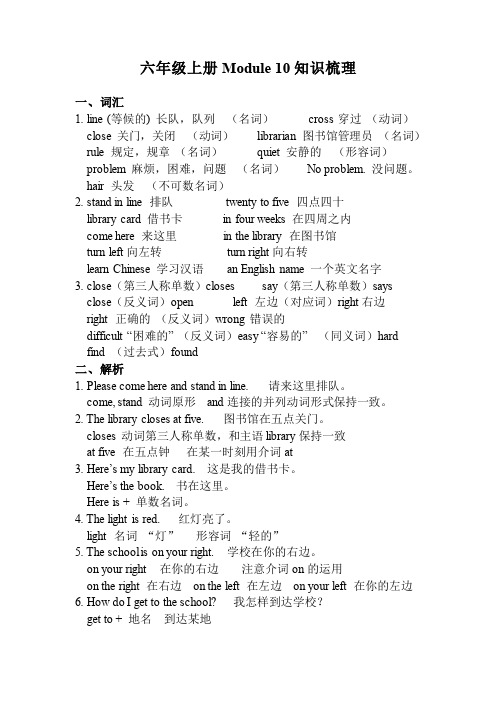
六年级上册Module 10知识梳理一、词汇1. line (等候的) 长队,队列(名词)cross 穿过(动词)close 关门,关闭(动词)librarian 图书馆管理员(名词)rule 规定,规章(名词)quiet 安静的(形容词)problem 麻烦,困难,问题(名词)No problem. 没问题。
hair 头发(不可数名词)2. stand in line 排队twenty to five 四点四十library card 借书卡in four weeks 在四周之内come here 来这里in the library 在图书馆turn left向左转turn right向右转learn Chinese 学习汉语an English name 一个英文名字3. close(第三人称单数)closes say(第三人称单数)says close(反义词)open left 左边(对应词)right右边right 正确的(反义词)wrong 错误的difficult “困难的”(反义词)easy “容易的” (同义词)hard find (过去式)found二、解析1. Please come here and stand in line. 请来这里排队。
come, stand 动词原形and连接的并列动词形式保持一致。
2. The library closes at five. 图书馆在五点关门。
closes 动词第三人称单数,和主语library保持一致at five 在五点钟在某一时刻用介词at3. Here’s my library card. 这是我的借书卡。
Here’s the book. 书在这里。
Here is + 单数名词。
4. The light is red. 红灯亮了。
light 名词“灯”形容词“轻的”5. The school is on your right. 学校在你的右边。
Module10知识点总结及练习
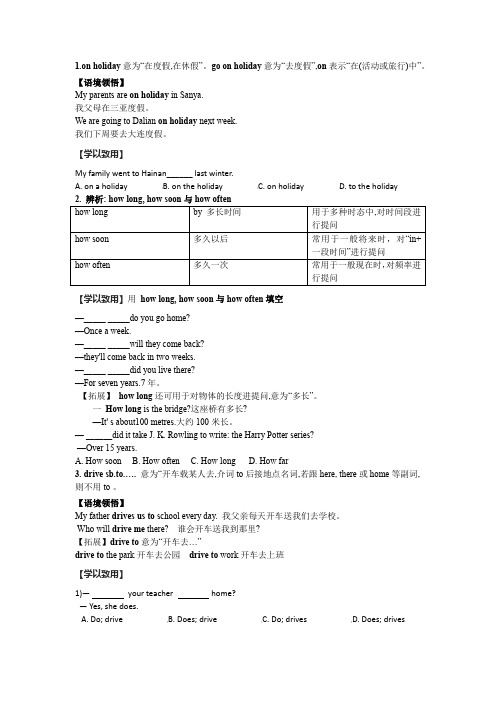
1.on holiday意为“在度假,在休假”。
go on holiday意为“去度假”,on表示“在(活动或旅行)中”。
【语境领悟】My parents are on holiday in Sanya.我父母在三亚度假。
We are going to Dalian on holiday next week.我们下周要去大连度假。
【学以致用】My family went to Hainan______ last winter.A. on a holidayB. on the holidayC. on holidayD. to the holiday【学以致用】用how long, how soon与how often填空—_____ _____do you go home?—Once a week.—_____ _____will they come back?—they'll come back in two weeks.—_____ _____did you live there?—For seven years.7年。
【拓展】how long还可用于对物体的长度进提问,意为“多长”。
一How long is the bridge?这座桥有多长?—It' s about100 metres.大约100米长。
— ______did it take J. K. Rowling to write: the Harry Potter series?—Over 15 years.A. How soonB. How oftenC. How longD. How far3. drive sb.to.….意为“开车载某人去,介词 to后接地点名词,若跟here, there或home等副词,则不用to 。
【语境领悟】My father drives us to school every day. 我父亲每天开车送我们去学校。
外研版六年级英语上册Module10模块知识总结2套

外研版六年级英语上册Module10模块知识总结2套Module 10模块小结1一、核心词汇1. 名词: line (等候的)长队,队列librarian图书馆管理员rule规定,规章problem麻烦,困难,问题2. 动词: close关门,关闭cross穿过 (马路等) ;渡过 (河)3. 形容词: quiet安静的4. 短语: stand in line 排队No problem. 没问题。
二、拓展词汇1. 名词: library图书馆2. 动词: hurry赶忙,赶紧3. 副词: straight成直线地4. 词组: library card借书卡三、核心句型1 . Please stand in line. 请排队。
解读:此句是祈使句。
祈使句的主语是第二人称you,通常省略,谓语动词用原形。
please在此是一个表示语气的词,不作为句子成分,既可以放在句首,也可以放在句尾,但是放在句尾时常用逗号与前面的内容分开。
举一反三: Please say it again. 请再说一遍。
2. — Where are we going, Simon? 西蒙,我们将要去哪里?— To the library. 去图书馆。
解读:此句是由where引导的特殊疑问句,询问某人将要去哪里。
问句用现在进行时态表示将来。
举一反三: — Where is she going? 她将要去哪里?— She is going to Shanghai. 她将要去上海。
— Where is Lucy going? 露西将要去哪里?— She is going to the park. 她将要去公园。
3. It s twenty to five now. 现在还差20分钟到5点。
解读:此句是表达时间的句型。
在句子中to表示“不足”,在这里是指“差多少分到几点”。
举一反三: It s ten to ten. 差10分钟到10点。
Module10知识
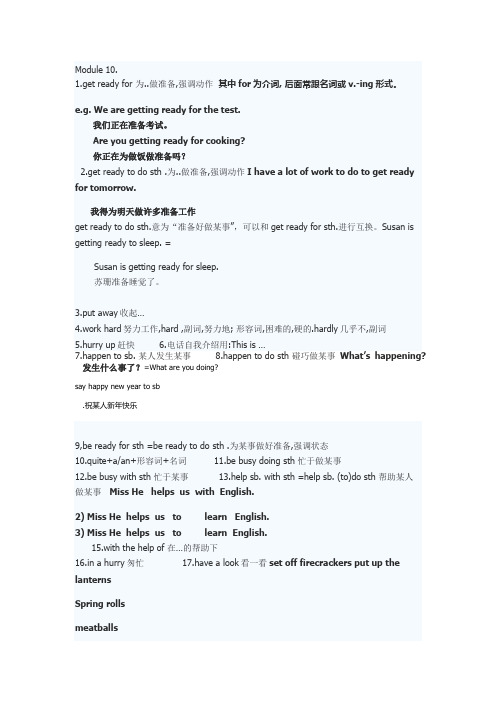
Module 10.1.get ready for 为..做准备,强调动作其中for为介词, 后面常跟名词或v.-ing形式。
e.g. We are getting ready for the test.我们正在准备考试。
Are you getting ready for cooking?你正在为做饭做准备吗?2.get ready to do sth .为..做准备,强调动作I have a lot of work to do to get ready for tomorrow.我得为明天做许多准备工作get ready to do sth.意为“准备好做某事”,可以和get ready for sth.进行互换。
Susan is getting ready to sleep. =Susan is getting ready for sleep.苏珊准备睡觉了。
3.put away收起…4.work hard努力工作,hard ,副词,努力地; 形容词,困难的,硬的.hardly几乎不,副词5.hurry up赶快6.电话自我介绍用:This is …7.happen to sb. 某人发生某事 8.happen to do sth 碰巧做某事What’s happening?发生什么事了?=What are you doing?say happy new year to sb.祝某人新年快乐9,be ready for sth =be ready to do sth .为某事做好准备,强调状态10.quite+a/an+形容词+名词 11.be busy doing sth 忙于做某事12.be busy with sth 忙于某事 13.help sb. with sth =help sb. (to)do sth 帮助某人做某事Miss He helps us with English.2) Miss He helps us to learn English.3) Miss He helps us to learn English.15.with the help of 在…的帮助下16.in a hurry匆忙 17.have a look看一看set off firecrackers put up the lanternsSpring rollsmeatballsChinese couplets1.18.sweep away扫去如果宾语为名词,可放在away之前或之后;如果宾语为代词,只能放在sweep与away之间。
外研八年级上Module10知识点复习 精华版 强烈推荐
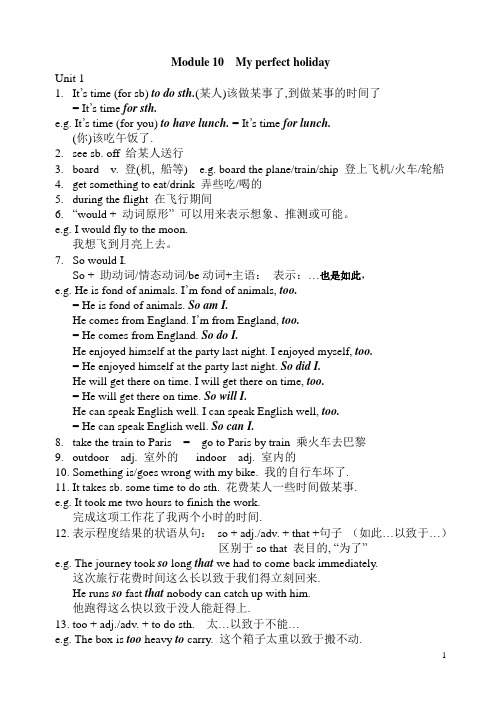
Module 10 My perfect holidayUnit 11.It’s time (for sb) to do sth.(某人)该做某事了,到做某事的时间了= It’s time for sth.e.g. It’s time (for you) to have lunch. = It’s time for lunch.(你)该吃午饭了.2.see sb. off 给某人送行3.board v. 登(机, 船等) e.g. board the plane/train/ship 登上飞机/火车/轮船4.get something to eat/drink 弄些吃/喝的5.during the flight 在飞行期间6.“would + 动词原形”可以用来表示想象、推测或可能。
e.g. I would fly to the moon.我想飞到月亮上去。
7.So would I.So + 助动词/情态动词/be动词+主语:表示:…也是如此,e.g. He is fond of animals. I’m fond of animals, too.= He is fond of animals. So am I.He comes from England. I’m from England, too.= He comes from England. So do I.He enjoyed himself at the party last night. I enjoyed myself, too.= He enjoyed himself at the party last night. So did I.He will get there on time. I will get there on time, too.= He will get there on time. So will I.He can speak English well. I can speak English well, too.= He can speak English well. So can I.8.take the train to Paris = go to Paris by train 乘火车去巴黎9.outdoor adj. 室外的indoor adj. 室内的10.Something is/goes wrong with my bike. 我的自行车坏了.11.It takes sb. some time to do sth. 花费某人一些时间做某事.e.g. It took me two hours to finish the work.完成这项工作花了我两个小时的时间.12.表示程度结果的状语从句:so + adj./adv. + that +句子(如此…以致于…)区别于so that 表目的, “为了”e.g. The journey took so long that we had to come back immediately.这次旅行花费时间这么长以致于我们得立刻回来.He runs so fast that nobody can catch up with him.他跑得这么快以致于没人能赶得上.13.too + adj./adv. + to do sth. 太…以致于不能…e.g. The box is too heavy to carry. 这个箱子太重以致于搬不动.( = The box is so heavy that I can’t carry it. )The girl is too young to go to school.这个女孩儿太小了还不能上学.( = The girl is so young that she can’t go to school. )14.although 引导让步状语从句although/ though 跟but不能同时使用15.stay/keep in touch with sb. 与某人保持联络16.Have a safe trip! 一路平安Have a nice trip! 祝你旅行愉快!17.perfect adj. 完美的e.g. Practice makes perfect. 熟能生巧.Unit 218.go (away) on business 出差19.as + adj./adv.(原级) + as…和…一样e.g. This book is as interesting as that one. 这本书和那本一样有趣.I have as many books as you. 我的书和你的书一样多.Would life be as easy as when your parents are around?生活会像父母在家那样的惬意吗?20.not so/as + adj./adv.(原级) + as…不如…e.g. This book is n’t so/as interesting as that one.这本书没有那本书有趣.I do n’t have so/as many books as you. 我的书没你的书多.Life would n’t be so/as easy as when your parents are around.生活没有像父母在家时那样惬意.21.a 14-year-old girl 这个14岁的女孩儿e.g. I have read a 90-page book. 我读了一本90页的书.He was the winner of the 100-meter race. 他是100米赛的获胜者.22.know little about sth. 对…了解少know much about sth. 对…了解多23.fill sth. with sth. 用…填满…e.g. Please fill the bottle with water. 请用水装满这个瓶子.be full of…充满…e.g. The train is full of passengers. 这辆火车载满了乘客.24.look after ourselves 照顾我们自己25.I don’t think …我认为…不…e.g. I don’t think you are right. 我认为你不对.She doesn’t think…她认为…不…e.g. She doesn’t think teenagers get enough practice.她认为青少年没有得到足够的锻炼.26.leave home 离开家27.go to college 上大学28.dress sb. 给某人穿衣服e.g. Mother is dressing the baby. 妈妈正在给孩子穿衣服.dress oneself 给自己穿衣服.e.g. Teachers should dress themselves properly.教师应当着装得体.比较: put on…表动作, “穿上”wear表状态, “穿着”29.enough adj. 足够的enough修饰adj.时, enough位于adj.之后e.g. warm enough good enough big enoughenough修饰n. 时, enough可前可后, 但一般在名词之前e.g. enough food/water30.not …at all 一点也不e.g. I don’t like meat at all. 我一点也不喜欢肉.For most teenagers,it wouldn’t be a holiday at all.对于大多数的年轻人来讲, 这可根本算不上个假期.Unit 342. take off 起飞land 着陆43. go on holiday 度假44. somewhere cool 某个凉爽的地方nothing important 没有重要的事45. surprising adj. 令人惊讶的(指物或事)e.g. The news is surprising. 这个消息是令人惊讶的.surprised adj. 惊讶的(指人)e.g. I am surprised at the news. 我对这个消息很惊讶.48. be made of…由…制成的e.g. The desk is made of wood. 这张课桌由木头制成的.Revision module B1.belong to…属于2.to some extent 从某种程度上讲。
- 1、下载文档前请自行甄别文档内容的完整性,平台不提供额外的编辑、内容补充、找答案等附加服务。
- 2、"仅部分预览"的文档,不可在线预览部分如存在完整性等问题,可反馈申请退款(可完整预览的文档不适用该条件!)。
- 3、如文档侵犯您的权益,请联系客服反馈,我们会尽快为您处理(人工客服工作时间:9:00-18:30)。
Module10 基础知识梳理Unit1Phrases1.为---做准备be/get ready for2.做灯笼make lanterns3.学舞龙learn a dragon dance4.打扫房子clean the house5. 扫地sweep the floor6.做饭cook the meal7.在工作at work 8.收拾东西put things away 9. 赶快hurry up10. 春节Spring FestivalKey sentences1.This is Tony speaping.(电话用语)我是托尼。
2. Are you getting ready for Spring Festival? 你们在为春节做准备吗?3. What are you doing? 此刻你在干什么?I’m making big red lanterns.我在制作大红灯笼。
4.They’re learning a dragon dance with my grandpa. 他们在和我爷爷一起学舞龙。
Unit 2Phrases1.看一看have a look at2.坏运气bad luck3.在圣诞节前夕on Christmas Eve4.在同一天on the same day5.扫去sweep away 6每年every year7. 舞狮a lion dance 8.春节前几天a few days before spring festival9.传统的家庭大餐traditional family dinner 10. 压岁钱luck moneyKey sentences1.我妈妈在打扫房子,清除坏运气。
My mother’s cleaning our house and sweeping away bad luck.2.春节在我国非常重要。
像圣诞节一样每年都过,但不在同一天。
Spring Festival is very important in my country.Like Christmas, it happens every year,but not on the same day.3.饭后,我们通常观看一个特别的电视节目。
After dinner,we usually watch a special programme on TV.4.我总是会得到红包,也就是压岁钱。
I always get a hongbao. It means luck money.一、根据句意和首字母提示完成单词。
1. He doesn’t visit his uncle, but he often s____ emails.2. Miss Wang is a teacher, she often gets i__________ for her lessons on the Internet.3. I often d_________ music from the Internet.4. Do you make travel p_______ on the Internet?5. What’s (发生)?6.My grandma is cooking the meal in the (厨房).7.Can I (加入) them?8.We (庆祝) Spring Festival in January or (二月).二、用动词的适当形式填空。
1. I __________(not play)computer games, I ______(do)my homework on the computer.3. I like _________ (eat) fruit very much.4. Would you like ___________(have) some fruit?5. What about ___________ (have) a break?6. They ____________(not leave) school at three.7. Art is ___________(I) favourite lesson.8. I _______________ (not have) any pencils. Please _________ (give) me one.9. He wants ___________ (buy) a new pen.10. Let me _________ (help) you.三、句型转换1.Daniel is playing computer games.否定句一般疑问句作肯定回答对划线部分提问2.My parents and I are visiting my uncles dan aunts.否定句一般疑问句作否定回答对划线部分提问四、选择题1. ______ do you use a computer ?I use it every day.A. How manyB. How longC. How oftenD. How2. Each of the students in your class ______his best to work hard _______his computer.A. do , onB. does, atC. does, onD. do , for3. --- What’s the time? ---_____.A. It’s half past seven.B. It’s at seven thirtyC. It’s seven past thirtyD. It’s thirty to seven4. --- Does the tiger Europe? --- Yes, it does.A. fromB. be fromC. comes fromD. come from5. do you write your homework on the computer?A. WhatB. How manyC. How oftenD. How6.. The book is lucy’s. Please _____.A. gives it to herB. give it to herC. give her itD. gives her it7. --- Would you like to go to the zoo, Tony? I hear there is a kangaroo from Australia inthe zoo. --- ______A. Yes, please.B. Yes, I am.C. That’s a good idea.D. Are you?8. I like reading novels _____Lu Xun.A. forB. atC. withD. by9. ---________ do you use a computer? --- Usually in the evening.A. How oftenB. HowC. WhenD. Where10. Betty’s aunt and uncle live in the USA. home is in Los Angeles.A. OurB. YourC. TheirD. His11. We go to school from Monday to Friday, we don’t go to school _the weekend.A. and; onB. and; atC. but; inD. but; at12. Let’s to the cinema with Betty and Lingling.A. goB. goingC. to goD. goes13. Sometimes I download music the Internet. Sometimes I talk my friends on QQ.A. to; toB. from; toC. on; withD. on; to14. Lingling’s father watches the football television Saturday and Sunday.A. by; onB. by; inC. on; onD. on; in15. He doesn’t like film. He goes to the cinema.A. oftenB. usuallyC. neverD. always16. ______ speak Chinese in English class.A. NotB. Can’tC. Don’tD. Doesn’t17. --- Can you use a computer? --- ______ .A. Yes, it’s very easyB. No, I don’tC. I am good at itD. Yes, I am五、完形填空(A)The Spring Festival(春节) is the Chinese New Year’s Day. It is usually 1 February. Everyone in China 2 the Spring Festival very much. When the Spring Festival 3 , Li Hong usually 4 his parents clean their house and 5 some shopping and other housework. On that 6 , everyone in China eats dumplings, New Year’s cakes, and other good 7 . Li Hong likes New Year’s cakes. But Wang Huisays dumplings 8 more delicious than New Year’s cakes. The Chinese peopl e 9 the New Year’s cake s and dumplings in their houses. They enjoy(享受) 10 meals very much.. How happy they are!( )1.A. after B. on C. in D. by( )2.A. has B. like C. remember D. likes( )3.A. goes B. comes C. gets D. hears( )4.A. helps B. makes C. gets D. takes( )5.A. buys B. does C. goes D. carries( )6.A. morning B. evening C. noon D. afternoon ( )7.A. food B. drinks C. vegetable D. fruit( )8.A. is B. are C. be D. to be( )9.A. find out B. buy C. eat D. sell( )10.A. their B. they C. them D. theirs(B)Jenny is my good friend. She is an 1 girl. She comes to China 2 her parents. She likes 3 very much, so she gets up early and 4 morning exercise, like running, jumping, playing 5 and so on. Then she has breakfast. She usually has eggs, milk and bread 6 breakfast. After breakfast, at around 7:30, she goes to school. She has six classes a day. Her favourite 7 are Chinese and Chinese history. Now the school year is over. She 8 go to school. Every year, she and her parents 9 back to America for Christmas Day on December 25th. She 10 a good time with her grandparents and cousins.( ) 51. A. America B. American C. English D. England( ) 52. A. with B. and C. has D. have( ) 53. A. play sports B. playing sports C. do sports D. play sport( ) 54. A. has B. plays C. makes D. does( )55. A. the basketball B. the piano C. basketball D. piano( ) 56. A. for B. to C. on D. at( ) 57. A. days B. clothes C. subjects D. sports( ) 58. A. needs not B. doesn’t need to C. doesn’t need D. needn’t to( ) 59. A. goes B. comes C. come D. go( ) 60. A. is B. takes C. has D. have。
